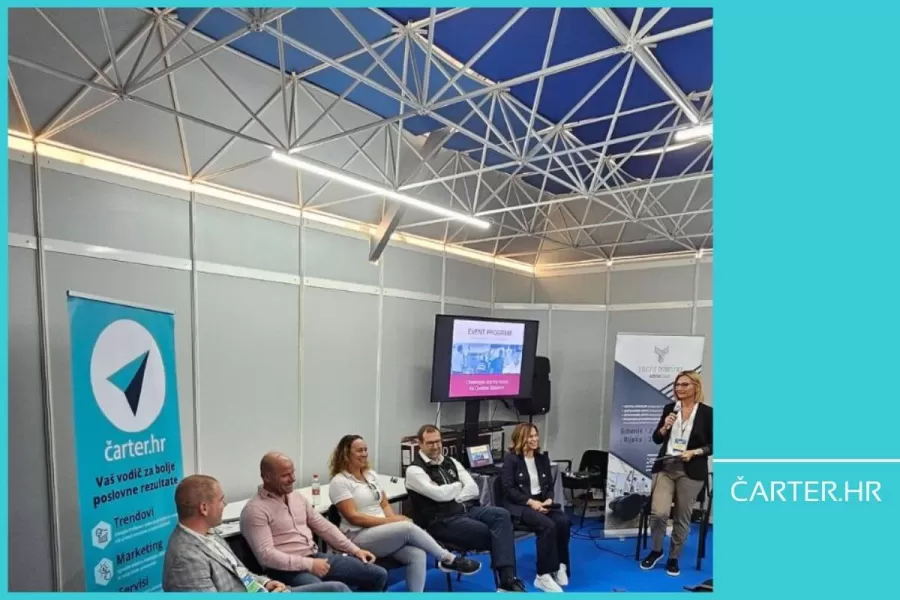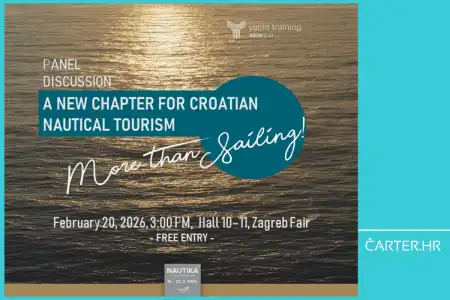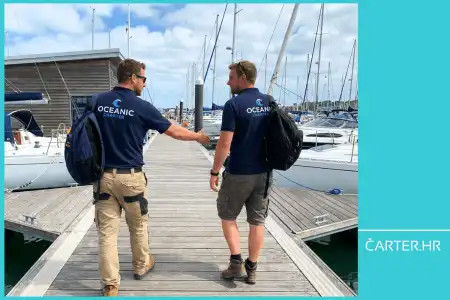
- 27.10.2023.
- News
The charter industry in Croatia, like any other industry, faces numerous challenges. As part of the Croatia Charter Expo, at the fair in Biograd, a panel was held in which the profession discussed the challenges faced by Croatian skippers, as well as their educators, such as the Adria Libar maritime school and renowned skipper academies in Croatia.
This year, čarter.hr has again participated in the Croatia Charter Expo, which took place on October 25 and 26 as part of the Biograd Boat Show.
Our platform would like to take this opportunity to thank CCE for their, once again, excellent organization and to everyone who came to visit us at our booth.
We would especially like to thank the participants of the panel "Challenges and the future for Croatian skippers", organised by the Adria Libar Maritime & Yacht Training Centre, moderated by the founder of our platform, Selma Čmelik.
During those two days in Biograd, everyone took the opportunity to look back on the past charter season, and make some conclusions about the past season.
And, as it usually happens - certain situations and particular challenges faced by every, or almost every, yacht charter in our country were highlighted. One of those challenges was discussed in this panel.

The "Challenges and Future for Croatian Skippers" panel's focus
The panel focused primarily on the importance of cooperation between training centres and skipper academies and the challenges they face. The panel was held in order to find answers to the questions that the participants felt were necessary for discussion and wider dialogue.
All participants pointed out that the most important thing is the professionalism of the skippers, who, in fact, represent the entire country and the yacht charter industry in the larger picture. They stand in front of charter companies, and their behaviour and expertise are the image of the yacht charter industry.
They believe that a country with one of the largest fleets deserves top skippers and want to achieve this with joint efforts.
For a long period, in the charters, everyone "pulled" to their side, and the market functioned that way. But today, with a fleet this large and with this many skippers, we should be aware that the time has come to know who the skipper should be. So it should be precisely defined what a skipper is and what their rights and obligations are.
Complete education of the skipper is necessary
Katarina Barić, representative of Adria Libar Training Centre drew attention to the obligation to have a certificate for a professional skipper issued by authorized colleges. Adria Libar, as one of such colleges has connected with skipper academies in order to complete this training in the best possible way.
Barić considers challenging that training program have not changed for years. They are good at their core, but people somehow find too much theory prescribed by the Ministry and insufficient actual practice.
- In a classroom, you can find people already familiar with vessels, so it is easy for them to master the material. Still, you also have those young people encountering this topic for the first time. It is challenging to approach this diverse group of people equally. However, it is mostly fascinating. - said Baric.
Barić also pointed out that the programs should follow the market's needs. As an obligor of the Ministry, the training centre respects the regulations given to them and does not go beyond those frameworks. But it is also very important to them that the people who complete their skipper courses become top skippers, and that is almost impossible without enough practical training.
She pointed out that the trainig centre is extremely satisfied with the fact that they have connected with the Association of charterers and with the skipper's academies. As an educational institution, their mission is to provide the best possible education to their students, and also to enable them to improve their skills through the network of their associates.

Challenges of the skipper - first-hand answers
Darko Majce, representative of Skipper4You, answered what challenges he and his team face with people who come to them for skipper training.
He said that in the beginning the skipper's courses lasted for 7 days, but sometime in 2008, which is considered to be the initial period for the expansion of the Croatian charter, it was realized that this time frame was too short for quality training.
The course was then extended to 4 weeks. It was intended for complete beginners who wanted either to sail privately or to become professional skippers.
- But 4 weeks is extremely difficult for an individual to set aside at once, so the course today lasts 2-3 weeks. The structure of people applying for the course is still diverse - from students to people who want to sail for some personal needs. We actually "put" a lot of people into the industry. - said Majce.
He cited the lack of manpower as a challenge and wondered if we would be able to and how we would bring that manpower back.
There are very few skippers - and even fewer female skippers
Matea Kobeščak from the Vodan Skipper Academy spoke about how the academy approaches the education of female skippers and what challenges they most often face.
Mrs. Kobeščak said that the biggest challenge is that there are few female skippers, and that the number of those who have a full-time occupation is even smaller. But that does not mean that skippers are not in demand.
- If our guest in the charter wants a skipper, it is our duty to find a skipper, and requests are numerous. But there are very visible changes in the market and it is happening more and more often that a woman who has, for example, completed training as a hostess, requalifies as a skipper. And that's fantastic, because she already has experience in sailing. - said Kobeščak.
She emphasized that they not only train skippers, but also educate them about diversity and tolerance towards different cultures.
She also said they are trying to promote skipper academies as essential for anyone who wants to sail or become a skipper.
But she also pointed out that for skippers who completed courses a few years ago, such a course is not enough today because technologies and conditions constantly change, and that two to three weeks for training is simply not enough.

Association of Croatian skippers - the most necessary information in one place
Mario Barešić, the Croatian Skipper and Crew Association representative, presented the association and explained why it was created.
He said that the idea developed because it became obvious that there are skippers in our country, but they are insufficiently equipped with basic information. Many of them did not know how to make a simple CV or did not have relevant information such as contract terms and conditions.
When asked whether anyone can become a member of the association, Barešić said:
- Only a skipper who meets our 3 criteria can become a member of the association, and if he doesn't have that, he can't join the association. It is necessary to have a business entity, C category license and skipper's insurance.
The best skippers for the best fleet in the Mediterranean
Toni Brkić from Croatia Sailing Academy said that the biggest challenge their academy faces is actually training each skipper so that he would be the best version of himself. He emphasised the quality of the skipper and how they work intensively on it in the academy.
-The charter company often has no influence on how the skipper will perform his service. Our academy aims to train that skipper so that he knows and can provide the charter guests with the best possible service. - said Brkic
He said that participants come to the academy with different levels of readiness. As an academy, in a period of just a few "short" weeks, these people should be fully qualified for sailing. He said that this is perhaps the biggest challenge for them.
Cooperation between training centre and skipper academies
Katarina Barić further explained how the cooperation between the Adria Libar and the skipper's academies looks like. She said that good communication is the most important among them because, as educators, they have a certain responsibility towards all their students.
They wanted to work together to provide all those interested with the best possible education, a complete program after which the participants will not wonder - "What now?", as it usually happens.
She also said that there is a definite shortage of female skippers in Croatian nautical. At the same time, she invited all those interested in studying or even furthering their education for the profession of skipper. Because not only are women in this profession indispensable, but this profession also has enormous potential.
There are skippers - but not enough good ones
At the end of the panel, the participants pointed out that everyone has plans and projects for expanding their business and improving their service because there is always room for growth.
Darko Majce gave his review on digitalisation in the yacht charter; he said that it is necessary and that charterers and skippers should and must use the advantages of modern technology. He also announced the release of their new application for skippers, which should appear on the market soon.
Mario Barešić said that they have been working on the branding of the Croatian skipper for some time and are working on a unique image that he or she will represent. He explained the details of the skipper's terms and conditions proposed as a framework for cooperation with charter companies.
Toni Brkić also emphasised how important the support of the local community is and how important the cooperation of training centres such as Adria Libar with skipper academies. He also noted that the association of everyone in nautical is vital and that they should do it more often because it is the only way forward.
Finally, the panel was interesting but too short for all the topics regarding skippers and their training that should be covered.
But one thing is sure: the future is bright if future Croatian skippers are educated in the best possible way.
It remains to be seen what the next opportunity will be and what developments will be agreed upon until the next meeting of this kind.
As a conclusion of the panel, we could cite a sentence by Matea Kobeščak - There are skippers, but not enough good ones.
Categories of trends
- News
- Sale
- Marketing
- SEO
- Web design
- Social media
- Technology
- Regulations
- Management
- Education
- Finances
- User experience
Newsletter
Sign up for the newsletter and receive the latest trends and tips straight to your inbox



